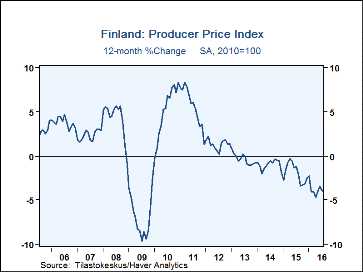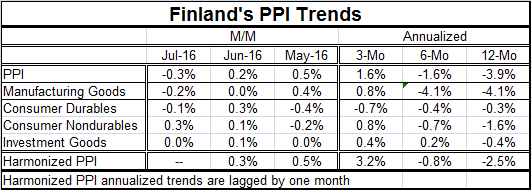 Global| Aug 24 2016
Global| Aug 24 2016Finland's PPI Continues to Descend
Summary
Producer prices in Finland continue to slip with a 0.3% drop in July ending a two month string of increases, the first multi-month PPI increases since having gained for three consecutive months from February to April of 2015. While [...]
 Producer prices in Finland continue to slip with a 0.3% drop in July ending a two month string of increases, the first multi-month PPI increases since having gained for three consecutive months from February to April of 2015.
Producer prices in Finland continue to slip with a 0.3% drop in July ending a two month string of increases, the first multi-month PPI increases since having gained for three consecutive months from February to April of 2015.
While oil continues to chop around on global markets threatening to break out and then to break down, inflation in Finland at the PPI level continues to drop.
Still, sequential inflation rates show inflation pressures are building as 12-month inflation is at -3.9%, six-month inflation at -1.6% and three-month inflation at +1.6%. Manufacturing shows inflation steadily falling at a -4.1% pace over six months and 12 months but gaining at a 0.8% pace over three months.
Consumer durable goods inflation is still falling on all horizons and showing no sign of letting up. Consumer nondurables, a series much affected by oil, shows inflation gradually turning higher. Investment goods show inflation off at a 0.4% pace over 12 months, rising to 0.2% over six months and to 0.4% over three months.
Only a handful of European countries have reported PPI data this early. Among them Portugal, Ireland and Austria show prices are falling. Germany shows a PPI increase. Like Finland, the other early reporters, even where prices are falling in July, show three-month inflation swinging higher. All still demonstrate price declines year-over-year, however.
The one-year-in sequential inflation picture is different from the year-on-year picture. Year-on-year prices still seem to be trending lower with deeper year-on-year gains. But within the one-year period, most early-reporting countries show inflation starting to gain traction and to move higher. Even so, the jury is still out on oil.
Oil prices continue to vacillate although they have not gone anywhere near their recent lows. Global oil market dynamics are a strange blend of geopolitical alliances and clashes as well as the product of unrelated geopolitical events in addition to oil market technology and market judgement. Rumors of a pending supplier oil deal continue to rock the markets from time to time although conditions still seem far from right for such a deal to be struck. Still, markets are respectful of the potential for an oil deal to upset the apple cart. Oil continues to amaze and confuse. Meanwhile, in the U.S. the oil rig count is starting to rise from its ashes. At a price around $50/barrel, some of the shuttered oil production makes sense again. OPEC and others have to be careful not to jump the gun on what makes sense. Prices that firm too quickly will draw in new supply and undermine price firming. Global demand is still quite weak. Oil producers still have the ability to cow markets but not to control them. The forces of economics still are superior to the geopolitical manipulations of oil producers and will remain so for a while longer.

Robert Brusca
AuthorMore in Author Profile »Robert A. Brusca is Chief Economist of Fact and Opinion Economics, a consulting firm he founded in Manhattan. He has been an economist on Wall Street for over 25 years. He has visited central banking and large institutional clients in over 30 countries in his career as an economist. Mr. Brusca was a Divisional Research Chief at the Federal Reserve Bank of NY (Chief of the International Financial markets Division), a Fed Watcher at Irving Trust and Chief Economist at Nikko Securities International. He is widely quoted and appears in various media. Mr. Brusca holds an MA and Ph.D. in economics from Michigan State University and a BA in Economics from the University of Michigan. His research pursues his strong interests in non aligned policy economics as well as international economics. FAO Economics’ research targets investors to assist them in making better investment decisions in stocks, bonds and in a variety of international assets. The company does not manage money and has no conflicts in giving economic advice.






